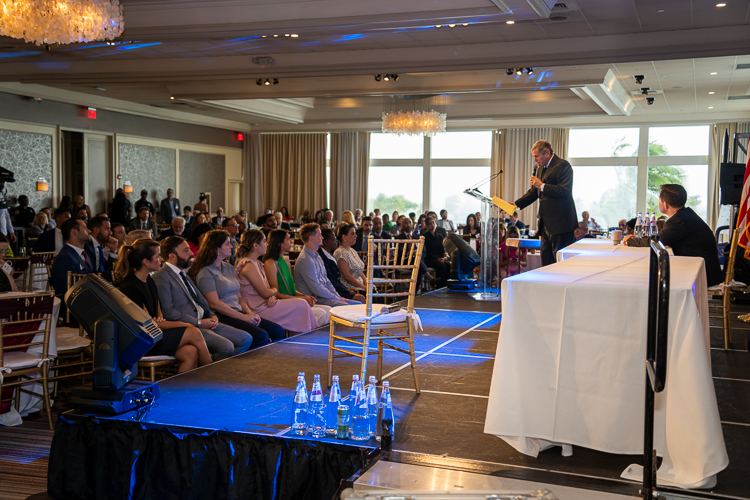
By Walter Villa, Special to STU
Artificial Intelligence is not the end of the legal profession.
That was made clear recently as St. Thomas University held a Continuing Legal Education (CLE) course on the use of AI.
Zachary L. Catanzaro, an assistant professor of law at STU’s Benjamin L. Crump College of Law, moderated the morning panel discussion. The CLE event, which lasted eight hours in total, also included a mock trial that centered on AI.
“From my understanding,” Professor Catanzaro said, “it was the best-attended CLE event ever at St. Thomas University. We got an outpouring of support and positive feedback from this event.”
Professor Catanzaro, a Fort Lauderdale native who also serves as the director of STU’s intellectual-property program, explained that the Florida Bar requires lawyers to take classes to keep current in their profession.
In essence, every three years, licensed attorneys must take 33 credit hours of CLE courses.
“You have to take a certain number of technological credits to show we are competent with technology,” Catanzaro said. “You also have to take a certain number of ethics credits. This course was eligible for both because it was about the ethical use of AI and also about how lawyers and judges are dealing with new technology.”
Professor Catanzaro said lawyers and judges have expressed concerns that AI is going to disrupt the marketplace and take away jobs.
“The worry is that AI can replicate a lot of the work that attorneys are trained to do because a lawyer, at the end of the day, is mostly a writer,” Catanzaro said.
“When they’re not in court, 70-to-90 percent of a lawyer’s day is spent on writing. Thus, the fear of automation and technology replacing lawyers is a real concern.”
The goal of the CLE event held by St. Thomas University was to show that technology might actually reinforce what lawyers do on a daily basis by helping them find better efficiency in their practices.
AI can help lawyers with rote tasks.
“It’s not that lawyers will go out of business,” Professor Catanzaro said. “But it might be that the mundane tasks go away.
“The law firms who are not capable of finding those efficiencies are the ones that are at risk.”
Catanzaro and other STU professors and scholars have done some extensive research on the use of AI.
For example, one of Catanzaro’s colleagues, Michael J. Hasday, has written about how judges are using AI to make better decisions in court.
As for the mock trial, Isbey A. Chicco served as one of the jurors.
Chicco, said the mock trial centered on a case about a self-automated car that did not react to a red light, resulting in a person’s death.
“The argument for the defense was that the car’s camera did not pick up the red light because of the presence of reflective-window panels on a downtown building,” Chicco said. “There were interesting arguments on both sides.”
Going forward, STU has formed a multidisciplinary task force of faculty members who will create an ethics code for the use of AI.
Dr. Michelle Johnson-Garcia, STU’s Provost and Chief Academic Officer, has assembled the task force from a group of some of the university’s top academics, theologians, and other experts.
STU President David A. Armstrong, J.D., is also a driving force behind this movement.
“AI must help –not hinder – life, liberty, and the pursuit of happiness,” President Armstrong said. “STU is pioneering curriculum, research, and an ethical code for society to develop and use AI reliably, responsibly, impartially, and transparently.”
Dr. Timothy M. Stafford, a professor at STU, is organizing the task force, which will also strive to create new AI-related classes, events, and research.
“Artificial Intelligence is much more than its dangers,” Dr. Stafford said. “STU is committed to becoming a model for effectively and ethically using AI for the greater good of society, including its religious and educational institutions.”

